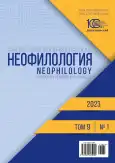Linguistic features of opposition and antonymy in the field of English-language economic nominations
- Authors: Shakiryanov L.M.1
-
Affiliations:
- Bashkir State University
- Issue: Vol 9, No 1 (2023)
- Pages: 97-110
- Section: LANGUAGES OF PEOPLES OF FOREIGN COUNTRIES (GERMANIC LANGUAGES)
- URL: https://journal-vniispk.ru/2587-6953/article/view/295685
- DOI: https://doi.org/10.20310/2587-6953-2023-9-1-97-110
- ID: 295685
Cite item
Full Text
Abstract
The study is devoted to the analysis of the implementation of opposite lexical units of financial orientation, which are in opposition to each other within the framework of simple and complex structures, in which one (contradiction) and two processes (antonymy) of nomination are involved. The theoretical significance of the analysis lies in the generalization of linguistic teachings on the problem of oppositions and antonyms of different years. The purpose of the work is to describe simple structures from the point of view of classifying opposition by part-of-speech and by the method of forming relations, and complex structures from the standpoint of word formation, lexico-semantic means, as well as a combination of both. The objectives of the study are to analyze the grammatical categories of case, animateness/inanimateness and number. Its novelty lies in the fact that, in contrast to the traditional consideration of antonyms as opposites between two or more structures, antonymy is also considered here within one element (opposition), which is understood as nomination. Such general scientific methods as analysis, synthesis, comparison, generalization are applied. To perform particular tasks, the continuous sampling method and the experimental method of logical-semantic classification of opposition and antonyms were used, which allows us to identify two classifications of the first phenomenon within one nomination and three classifications of the second phenomenon within two nominations.
About the authors
L. M. Shakiryanov
Bashkir State University
Author for correspondence.
Email: levshakiryanov@gmail.com
ORCID iD: 0000-0002-3110-8271
Cand. Sci. (Philology)
32 Zaki Validi St., Ufa 450076, Republic of Bashkortostan, Russian FederationReferences
- Pokoyakova K.A. Basic opposing pair good/bad in the Khakass and Russian language consciousness. Mezhdu-narodnyj zhurnal gumanitarnyh i estestvennyh nauk = International Journal of the Humanities and Natural Science, 2022, no. 6-3 (69), pp. 63-66. (In Russ.) http://doi.org/10.24412/2500-1000-2022-6-3-63-66, https://elibrary.ru/ohviki
- Maytiyeva R.A. Comparative analysis of antonymous stable combinations of Russian and English languages. Universum: filologiya i iskusstvovedeniye = Universum: Philology and Art Criticism, 2022, no. 3 (93), pp. 34-35. (In Russ.) https://elibrary.ru/qydfox
- Bochina T.G. Contrast in Tuvan proverbs. Novyye issledovaniya Tuvy = The New Research of Tuva, 2022, no. 1, pp. 37-46. (In Russ.) https://doi.org/10.25178/nit.2022.1.3, https://elibrary.ru/julski
- Savvinova S.N. Lexical anthonymy of nuns in Even language. The Scientific Heritage, 2021, no. 78-5 (78), pp. 42-43. (In Russ.) http://doi.org/10.24412/9215-0365-2021-78-5-42-43, https://elibrary.ru/zjkcym
- Dzuganova R.K. Ablaut alternations and derivational affixes as a means of forming verbal antonyms in the Kabardian-Circassian language. Filologicheskiye nauki. Voprosy teorii i praktiki = Philological Sciences. Questions of Theory and Practice, 2022, vol. 15, no. 5, pp. 1439-1443. (In Russ.) https://doi.org/10.30853/phil20220215, https://elibrary.ru/uorjrx
- Berberov B.A. Functional potential of antonyms in the Karachay-Balkarian riddle. Izvestiya Kabardino-Balkarskogo nauchnogo tsentra RAN = News of the Kabardino-Balkarian Scientific Center of Russian Academy of Scienc, 2021, no. 3 (101), pp. 126-132. (In Russ.) https://doi.org/10.35330/1991-6639-2021-3-101-126-132, https://elibrary.ru/tjrbpr
- Valiyeva M.Z. Specifics of functioning of linguistic antonyms in written monuments of the Tatar language of the 17th–18th centuries (on the example of lexical units with the meaning “salamatlek” – “chir” (“health” – “disease”)). Vestnik Chuvashskogo gosudarstvennogo pedagogicheskogo universiteta im. I.Y. Yakovleva = I. Yakovlev Chuvash State Pedagogical University Bulletin, 2022, no. 1 (114), pp. 17-22. (In Russ.) https://doi.org/10.26293/chgpu.2022. 114.1.003, https://elibrary.ru/qjkdtk
- Ermakov S.A. On the issue of creating dictionaries of synonyms and antonyms (on the material of the English language). Izvestiya Volgogradskogo gosudarstvennogo pedagogicheskogo universiteta = Ivzestia of the Volgograd State Pedagogical University, 2022, no. 2 (165), pp. 161-166. (In Russ.) https://elibrary.ru/kivbfx
- Lavrova N.A. To the question of the definition of antonymy and the typological classification of antonyms. Vestnik Moskovskogo gosudarstvennogo lingvisticheskogo universiteta. Gumanitarnyye nauki = Vestnik of Moscow State Linguistic University. Humanities, 2017, no. 7 (779), pp. 62-71. (In Russ.) https://elibrary.ru/hfvixl
- Viktorina T.V. Antonymy as a means to create contrast in a. I. Kuprin’s stories. Filologicheskiye nauki. Voprosy teorii i praktiki = Philological Sciences. Questions of Theory and Practice, 2020, vol. 13, no. 3, pp. 103-106. (In Russ.) https://doi.org/10.30853/filnauki.2020.3.21, https://elibrary.ru/fjvbcy
- Shakiryanov L.M. Logical and semantic relations of contrast in paradigmatics and syntagmatics. Vestnik Bash-kirskogo universiteta = Bulletin of Bashkir University, 2012, vol. 17, no. 1, pp. 249-250. (In Russ.) https://elibrary.ru/oxtmfl
- Shakiryanov L.M. Logiko-semanticheskaya kategoriya kontrasta v finansovo-ehkonomicheskom media-diskurse (na materiale angloyazychnykh internet-istochnikov): avtoref. dis. ... kand. filol. nauk [Logical and Semantic Category of Contrast in the Financial and Economic Media Discourse (On the Material of English-Language Internet Sources). Cand. Sci. (Philol.) diss. abstr.]. Ufa, 2014. Available at: https://search.rsl.ru/ru/record/01007857760
Supplementary files









